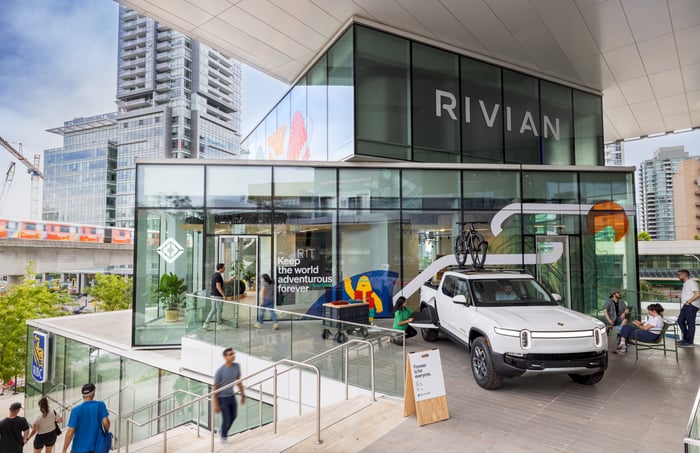Rivian (RIVN -2.37%) and Lucid (LCID -2.55%) were two of the hottest EV stocks of 2021. Rivian, a maker of electric pickups, SUVs, and vans, went public at $78 in November of 2021, and its stock more than doubled to an all-time high of $172.01 a week after that. Lucid, a maker of luxury sedans, went public by merging with a special purpose acquisition company (SPAC) in July 2021; its stock opened at $25.24 and also more than doubled to its record high of $55.52 in November.
But today, Rivian's stock trades at about $11 and Lucid is only worth $3 a share. The bulls retreated as both companies failed to meet their lofty production targets. Rising interest rates also compressed their valuations and cast a harsh light on their ugly balance sheets. So should investors buy either of these burned-out EV stocks as a turnaround play?

Image source: Rivian.
Rivian expects its production to flatten out this year
Rivian produces three types of vehicles: the R1T pickup, the R1S full-size SUV, and a custom electric delivery van (EDV) for its leading investor, Amazon (NASDAQ: AMZN). Its next vehicle, the R2 midsize SUV, should hit the market in 2026.
When Rivian went public, it claimed it could produce 50,000 vehicles in 2022. But it manufactured only 24,337 vehicles that year as it dealt with supply chain constraints, and it pushed back its target of 50,000 vehicles annually to 2023.
It easily surpassed that goal by producing 57,232 vehicles -- but it expects to produce only 57,000 vehicles in 2024.
Rivian predicts its production will remain stagnant this year as it deals with higher interest rates, a slower EV market, and the planned shutdown of its main plant in Normal, Illinois, for "several weeks" in the second quarter.
The shutdown is to allow an upgrade its production rates by 30%, roll out new in-vehicle technologies for its R1 platform, and reduce its raw material costs. Analysts expect its revenue to only rise 10% to $4.9 billion in 2024 as it implements those changes.
As sales growth slows down, it plans to boost its margins by building more vehicles with its in-house Enduro drive unit and laying off 10% of its workforce. But it only slightly narrowed its operating loss from $6.9 billion in 2022 to $5.7 billion in 2023, and analysts anticipate an operating loss of $4.8 billion in 2024.
Rivian ended 2023 with $10.5 billion in liquidity, but it could quickly burn through that cash if it doesn't ramp up its production again over the next few years. On the bright side, the stock looks cheap at two times this year's sales -- and Amazon still hasn't sold its sinking shares of the EV maker.
Lucid is struggling to scale up its business
Lucid currently sells several versions of its Air luxury sedan, and it plans to launch its second vehicle, the Gravity SUV, in late 2024. During its pre-SPAC presentation, it claimed it could produce 20,000 vehicles in 2022 and 49,000 vehicles in 2023.
In reality, it produced only 7,180 vehicles in 2022 and 8,428 in 2023. Like Rivian, Lucid struggled with supply chain constraints, high interest rates, and a weak EV market. The EV pricing war forced Lucid to slash its prices. It expects to produce only 9,000 vehicles in 2024.
Yet Lucid continues to make bold claims regarding its future. In May 2022, CEO Peter Rawlinson set a goal of producing over 500,000 vehicles annually by 2025. He believes it can achieve that goal with the support of the Saudi Arabian government, which owns more than 60% of its shares through its Public Investment Fund (PIF).
Unfortunately, the math doesn't add up. The planned expansion of its Arizona plant will only boost its annual production capacity to 90,000 vehicles by 2024, while its new Saudi Arabian plant -- which can only produce 5,000 vehicles this year -- might reach an annual capacity of 155,000 by the "middle of the decade," management says. So even if everything goes right, the company would produce a maximum of only 245,000 vehicles annually by 2025.
That fuzzy math is worrisome for a company that generated only $595 million in revenue with an operating loss of $3.1 billion in 2023. For 2024, analysts expect its revenue to rise 33% to $794 million as it slightly narrows its operating loss to $2.6 billion.
That's not a bright outlook for a company with $4.6 billion in total liquidity, and its stock still doesn't seem like a screaming bargain at five times this year's sales.
The better buy: Rivian
Rivian and Lucid will probably remain out of favor this year as they both struggle to ramp up their production in a challenging market. But over the long term, Rivian still looks like a better investment than Lucid.
It's producing more vehicles and losing less money on each vehicle. It isn't setting up its investors for disappointment with overly ambitious growth targets or depending heavily on overseas investors. And Rivian's stock looks a lot cheaper relative to its growth.





